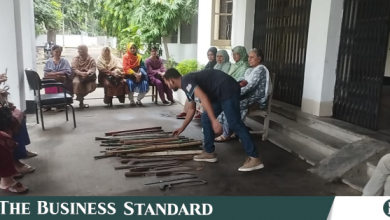Increasing competitiveness must to face post-LDC challenges: Experts


To achieve this, the country needs development initiatives based on high-road strategies, they said at a workshop organised on Sunday (9 June) to discuss the draft of the Bangladesh Smooth Transition Strategy (STS).
Representational image. Photo: Collected
“>
Representational image. Photo: Collected
Bangladesh will face significant challenges after transitioning from the status of a least developed country (LDC) and these challenges will not be met without increasing competitiveness, experts say.
To achieve this, the country needs development initiatives based on high-road strategies, they said at a workshop organised on Sunday (9 June) to discuss the draft of the Bangladesh Smooth Transition Strategy (STS).
Experts noted that the incentives and subsidies currently available to Bangladesh for exporting its products to some countries will no longer be available after the country graduates from LDC status. As a result, Bangladesh will have to face tough competition.
To meet this competition, Bangladesh’s capacity needs to be increased, they added at the workshop, which was jointly organised by the Economic Relations Division (ERD) and the United Nations Department of Economic and Social Affairs.
Dr M A Razzaque, national consultant for the STS, emphasised that environmental issues will be crucial and that initiatives are needed to protect the environment. He stressed that the government’s spending power should be increased, particularly by expanding fiscal space.
“Interest rates on international loans will increase. Long-term initiatives are needed for sound macroeconomic management, including diversification of exports to build repayment capacity,” he added.
Dr Razzaque also noted that G20 countries are implementing additional protection measures, and adapting to new technology in this context will be a significant challenge for Bangladesh.
He highlighted that low-wage labour, once an advantage for Bangladesh, is diminishing. “Now we need a high-road transformation. High-road means quality, innovation, a better environment, a skilled workforce, labour standards, and compliance.”
He warned that growth might slow down after the LDC transition. “If the transformation is not done properly, increasing growth will be a big challenge, and there will be a risk of Bangladesh falling into the middle-income trap,” he said.
The draft Smooth Transition Strategy (STS) outlines five pillars for Bangladesh’s transition from LDC status.
The first pillar focuses on stabilising the macroeconomy, including controlling inflation and mobilising domestic resources.
The second pillar addresses how to exploit opportunities that arise after graduation, such as availing free trade agreements (FTAs) and diversifying exports.
The third pillar aims to enhance trade competitiveness. The fourth pillar emphasises increasing productivity.
The fifth pillar concerns the level of support that can be obtained from international partners.
Bangladesh met all the criteria for graduation from the LDC status in the consecutive 2018 and 2021 triennial reviews of the Committee for Development Policy (CDP) of the United Nations. Following a five years’ preparatory period, Bangladesh will graduate from the LDC status in November 2026.
It is recommended by the United Nations that a graduating LDC should prepare a national Smooth Transition Strategy (STS) during the preparatory period in cooperation with its development and trading partners and with targeted assistance from the UN system.
As the chief guest of the event, Finance Minister Abul Hassan Mahmood Ali stated that the country can overcome all the challenges of LDC graduation if the right policies and strategies are implemented, just as it did when facing Covid-19 and other difficulties in the past.
He emphasised the need for proper strategy development with stakeholder participation.
“Our strengths lie in our hardworking people, vibrant entrepreneurs, and the young generation,” the finance minister said.
State Minister for Finance Waseqa Ayesha Khan said the STS should promote structural transformation to avoid the middle-income trap. She also noted that the STS should be aligned with Bangladesh’s long-term development goals.
ERD Secretary Shahriar Kader Siddiky called for aligning the STS with the country’s 9th Five-Year Plan. He also emphasised turning the challenges of LDC graduation into opportunities.
UN Resident Coordinator in Bangladesh, Gwyn Lewis, said that the United Nations system is committed to supporting Bangladesh as it moves towards graduation.




